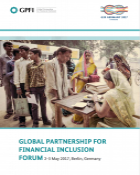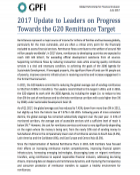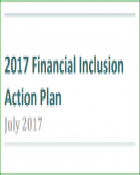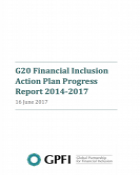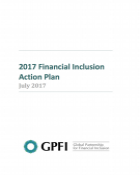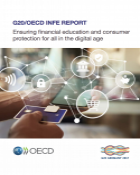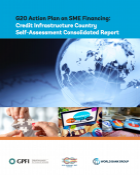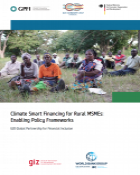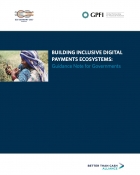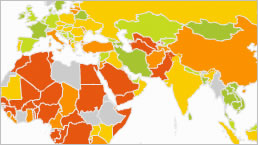Report | Aug 17, 2017
Hosted by the German G20 Presidency, the GPFI Forum was held in Berlin in May 2016, paving the way to the G20 July Summit. This event provided a space for exchange and dialogue and attracted around 270 participants from more than 60 countries. Experts from many different backgrounds reflected on the GPFI’s current priorities. Important stakeholders from G20 and non-G20 countries, the private sector, financial service providers and Fintechs, government agencies and central banks, regulators and development experts gave important inputs that have affected and will continue to influence GPFI’s scope of work.
Report | Jul 24, 2017
This report summarizes GPFI activities from October 2016 to July 2017, presents the main achievements under the German Presidency and describes the outlook for the rest of 2017 and into the start of the Argentinean Presidency.Guided by the three pillars of the German G20 Presidency: ‘building resilience, improving sustainability, and assuming responsibility’, in 2017 the GPFI works towards further strengthening the functioning of the GPFI and pursues the implementation of the 2014 G20 FIAP and subsequent 2017 G20 FIAP. This year, the GPFI puts particular focus on:Review and Update of the G20 Financial Inclusion Action Plan;Implementation of the G20 High-Level Principles for Digital Financial Inclusion;Implementation of the G20 Action Plan on SME Financing; andIncreased focus, underpinned
Report | Nov 28, 2017
In 2017, G20 countries are updating National Remittance Plans to encompass key G20 commitments since the finalization of the plans under Turkey’s 2015 G20 Presidency. This will include alignment with the 2030 Agenda and Addis Ababa Action Agenda, consideration of the impact of ‘de-risking’ activities on remittance flows and costs, and application of the 2016 G20 High-Level Principles for Digital Financial Inclusion. The updated National Remittance Plans will be finalized by the end of the German G20 Presidency. Non-G20 GPFI countries being a large source of remittance outflows worldwide will be encouraged to share information on their national remittance measures to enable cross-border remittance flows.Moving forward, G20 countries should continue to focus on cost reduction objectives,
Report | Apr 12, 2018
The 2017 G20 FIAP, a revision of the earlier 2010 and 2014 editions, reaffirms the G20 Leaders' commitment to advance financial inclusion benefiting all countries and all people, including in particular underserved groups (such as the poor, women, youth, and people living in remote rural areas) and vulnerable groups (which include elderly people, migrants, forcibly displaced persons).Under this revised G20 FIAP, the GPFI identifies four key drivers that will set the stage for continuing the progress in achieving financial inclusion: (1) recognition of the 2030 Agenda for Sustainable Development as the overarching framework for sustainable development globally; (2) the rapid development and penetration of digital innovations; (3) increased attention to the importance of responsible access
Report | Jul 18, 2017
This report takes stock of the work of the G20 GPFI under the 2014 G20 Financial Inclusion Action Plan (FIAP). The 2014 FIAP contains 10 action areas and a results framework, which defines a set of five cross-cutting issues that are relevant for the work of the GPFI as such and all Subgroups. The 2014 FIAP was put into practice mainly by the four Subgroups of the GPFI and their Implementing Partners. The GPFI produced numerous outputs since 20141. Several of those had and continue to have a direct effect on the implementation of (inter)national policies and regulations, as well as private sector activities that facilitate financial inclusion. Further, the GPFI has responded to additional financial inclusion commitments made by the Leaders since the adoption of the FIAP through its work.
Report | Jul 24, 2017
The 2017 G20 FIAP, a revision of the earlier 2010 and 2014 editions, reaffirms the G20 Leaders' commitment to advance financial inclusion benefiting all countries and all people, including in particular underserved groups (such as the poor, women, youth, and people living in remote rural areas) and vulnerable groups (which include elderly people, migrants, forcibly displaced persons).Under this revised G20 FIAP, the GPFI identifies four key drivers that will set the stage for continuing the progress in achieving financial inclusion: (1) recognition of the 2030 Agenda for Sustainable Development as the overarching framework for sustainable development globally; (2) the rapid development and penetration of digital innovations; (3) increased attention to the importance of responsible access
G20/OECD INFE REPORT Ensuring financial education and consumer protection for all in the digital age
Report | Jul 18, 2017
Prepared by the OECD International Network on Financial Education (OECD/INFE) through an iterative consultation process between 2015 and 2017, this report supports Principle 6 of the High-Level Principles for Digital Financial Inclusion and contributes to G20 and GPFI efforts to prioritise their implementation. It discusses the implications of the digitalisation of finance for financial education and relevant consumer protection issues and provides an overview of digital financial services around the world. It also explores the challenges and opportunities resulting from today’s digital revolution for consumers, small businesses and particularly disadvantaged groups; and illustrates the use of digital tools to deliver financial education, while addressing the role of public, private and
Report | Jul 18, 2017
Small and Medium-Sized enterprises (SMEs) make up a large majority of businesses globally and play a crucial role in global economic development through job creation, economic growth, and innovation. For the health of the global economy, it is imperative that they have access to the needed credit to grow and expand. Credit infrastructure (CI) remains an important element in ensuring that SMEs (and others) have access to credit when needed and at the lowest possible cost.The G20 countries have committed to implementing reform in the three CI areas based on this baseline report and to monitor progress every two years. Aimed at capturing the strengths and areas of improvement for the G20 countries in each of the areas of credit infrastructure (CI), this report is expected to be used as the
Report | Aug 3, 2017
Climate change increases risks and presents significant challenges as well as potential opportunities for rural Micro, Small and Medium Enterprises (MSMEs.) However, financing is crucial for enabling these MSMEs to adopt needed practices and investments in technologies and approaches that are climate smart. This is particularly challenging for those MSMEs in the rural and agricultural setting which are most vulnerable and already have the most difficulties accessing finance.This document presents a synthesis of the key lessons and implications of climate change needs and solutions for MSMEs in developing countries with an emphasis on the implications for governments and development agencies to consider. It is enriched with many case examples of practices implemented around the world. Based
Report | Jun 20, 2017
This note provides policymakers and other government oficials with an overview of the major practical issues to consider when planning the expansion of financial inclusion through the use of digital payments ecosystems. It briefly describes the potential of such ecosystems to advance financial inclusion. It then outlines how to address four key challenges when implementing the principles and policy recommendations of the G20, its implementing partners, and global financial system standard setters. It provides practical solutions that government oficials can follow to help structure their approach when facing these common challenges.


